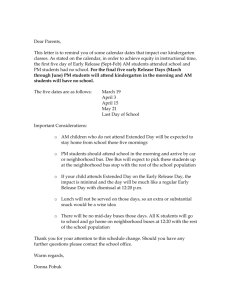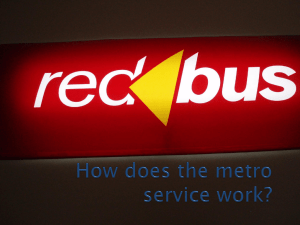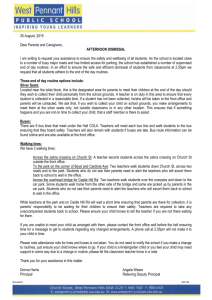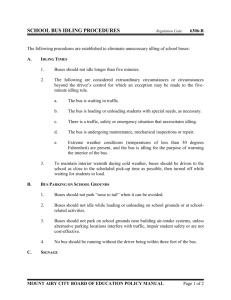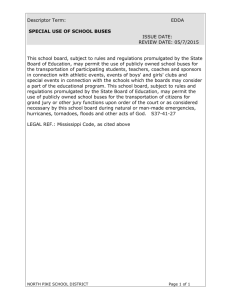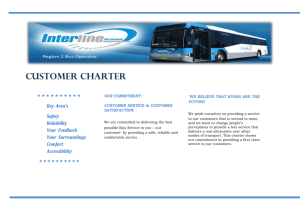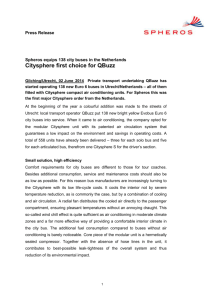API Transactional API - Denver Public Schools
advertisement
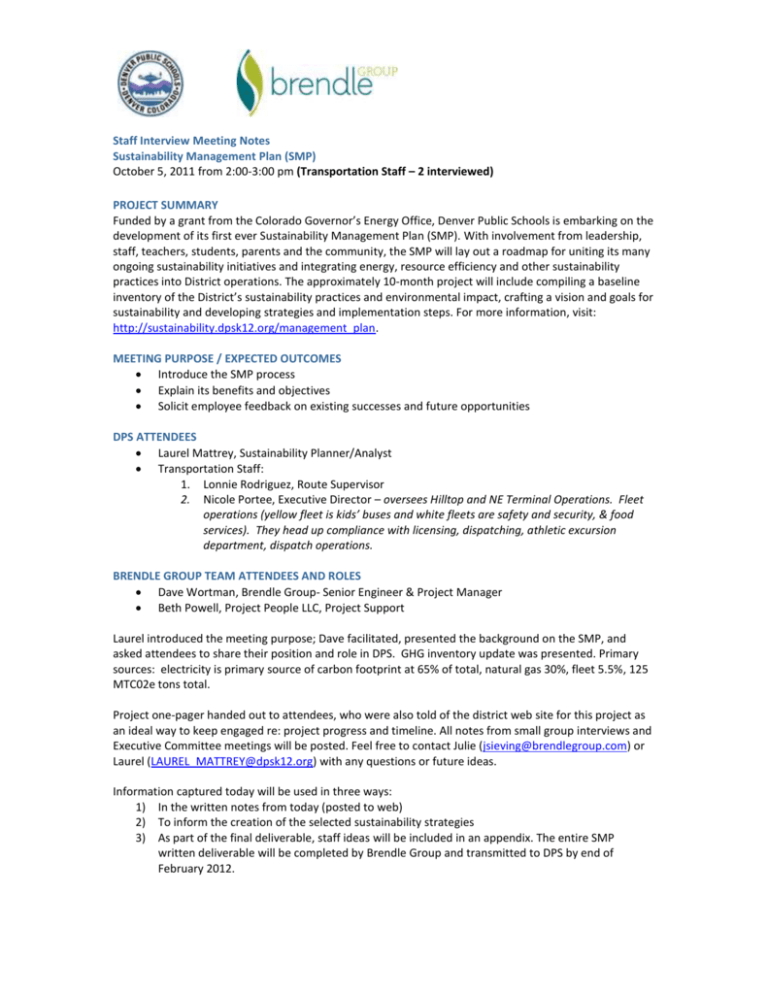
Staff Interview Meeting Notes Sustainability Management Plan (SMP) October 5, 2011 from 2:00-3:00 pm (Transportation Staff – 2 interviewed) PROJECT SUMMARY Funded by a grant from the Colorado Governor’s Energy Office, Denver Public Schools is embarking on the development of its first ever Sustainability Management Plan (SMP). With involvement from leadership, staff, teachers, students, parents and the community, the SMP will lay out a roadmap for uniting its many ongoing sustainability initiatives and integrating energy, resource efficiency and other sustainability practices into District operations. The approximately 10-month project will include compiling a baseline inventory of the District’s sustainability practices and environmental impact, crafting a vision and goals for sustainability and developing strategies and implementation steps. For more information, visit: http://sustainability.dpsk12.org/management_plan. MEETING PURPOSE / EXPECTED OUTCOMES Introduce the SMP process Explain its benefits and objectives Solicit employee feedback on existing successes and future opportunities DPS ATTENDEES Laurel Mattrey, Sustainability Planner/Analyst Transportation Staff: 1. Lonnie Rodriguez, Route Supervisor 2. Nicole Portee, Executive Director – oversees Hilltop and NE Terminal Operations. Fleet operations (yellow fleet is kids’ buses and white fleets are safety and security, & food services). They head up compliance with licensing, dispatching, athletic excursion department, dispatch operations. BRENDLE GROUP TEAM ATTENDEES AND ROLES Dave Wortman, Brendle Group- Senior Engineer & Project Manager Beth Powell, Project People LLC, Project Support Laurel introduced the meeting purpose; Dave facilitated, presented the background on the SMP, and asked attendees to share their position and role in DPS. GHG inventory update was presented. Primary sources: electricity is primary source of carbon footprint at 65% of total, natural gas 30%, fleet 5.5%, 125 MTC02e tons total. Project one-pager handed out to attendees, who were also told of the district web site for this project as an ideal way to keep engaged re: project progress and timeline. All notes from small group interviews and Executive Committee meetings will be posted. Feel free to contact Julie (jsieving@brendlegroup.com) or Laurel (LAUREL_MATTREY@dpsk12.org) with any questions or future ideas. Information captured today will be used in three ways: 1) In the written notes from today (posted to web) 2) To inform the creation of the selected sustainability strategies 3) As part of the final deliverable, staff ideas will be included in an appendix. The entire SMP written deliverable will be completed by Brendle Group and transmitted to DPS by end of February 2012. Dave Wortman (Facilitator): Today is the fifth of six targeted groups at DPS that we have met with for these interviews. The Executive Committee will reconvene soon (and through project end in February 2012) to discuss vision, policy, and guiding principles and to develop goals. This will inform bottom up strategy development. For strategy development, these interviews are key to generate ideas for our strategy “hopper”. The May 2011 district-wide survey that solicited broad input from the district (and got 200-300 responses) will also help inform the strategies. DPS Existing Successes: Fact: Transportation has 600+ employees Fact: All buses log a total of 22,000 miles per day Fact: 323 buses on the road daily VersaTrans software in place now to optimize route planning. The software can identify # of buses that are scheduled to go down a given street. GPS is in every bus now as well as cameras. GPS track logs record speed, length of time the bus is stopped, actual time the bus passed a given stop. They can import GPS track logs for better routes after trying them out. Route optimization ideas are encouraged. Drivers suggest better routes; they choose the one using the fewest miles after safety is considered. A system for verifying special needs kids is present on buses; same for regular education kids, via manifests (names/addresses). Staff is investigating fleet operations’ fluids/solvents (sustainable window washings, oils, recycled content oil) and vetting them with the vendors to ensure they work well. They’ve moved away from propane (to fuel buses – in the 80’s – they converted 100 buses), although they kept heat warm in the bus. The challenge was that the buses had no power, and getting the propane in the bus. They use biodiesel in winter but not summer. Recycling in operations is popular – bottles/cans, paper, Shred-It company comes. In winter, idling tracking is a focus – the GPS software allows for idling reporting. They also follow City of Denver idling policy. The city can cite vehicles for idling over 5 minutes. Some of the newer buses shut off after a certain number of minutes of idling. Driver has to turn it on again; this is intentional so drivers don’t idle too long. High school students use RTD passes – monthly pass for academic year. Parents can get discounted rates for RTD passes. Transportation Department participates in Safe Routes to School (to encourage walking) New Employee Training covers ideas on carpooling, etc. Allocating budget for newer buses, so maintenance costs are lower. Average bus age is 7 years (some districts have a 12-20 year average). Note: DPS would like to research how many miles a bus gets in a year and over its lifetime. The white fleet has some hybrids for Transportation staff. DPS Future Opportunities: Gather data on what actions would result in cost reductions, to justify new purchases. Routing Directions: Help driver get from Point A to Point B more efficiently. Study his route and suggest alternatives if makes sense. Time and distance are their solid factors; they get complaints when on residential streets. The dispatchers use CDOT’s highway camera. They just hired a business analyst to analyze potential cost reductions of different routing strategies. VMT 4-6 million miles/year. How to reduce? They could look more at biodiesel – need first to look at the type of buses they have – would they have to purchase new ones? Working on a fleet policy to replace older cars with hybrids. Jim: perhaps start with an “encouragement” rather than a mandate. RTD discount program for DPS staff to bus to work. Transportation Department has a monthly Colorado school districts meeting with Directors and Fleet Maintenance Managers and Directors (topics: latest and greatest vehicles, fluids, etc.). Purchase more efficient buses. “Green buses” are offered by some vendors, but DPS hesitates to be the guinea pig. Coordination on purchase of vehicles among various departments. Some direction from Fleet department is provided, but education/awareness could be more diffuse. Pool car and pool bikes for reserving for inter-building travel may be part of a VMT reduction policy. Identify opportunities that impact other departments, then communicate/coordinate those strategies to prompt people to think in similar ways. (The SMP will support this opportunity). The teaming approach at the base of the SMP is necessary to ensure it goes district-wide Strong opportunities with Outreach/Education: o Outreach to hourly employees – educate them about sustainability with handouts, prompts/signs, access to SMP and/or training? Could include info on commuting options. o Educate employees re: behaviors “at home” so they will learn to carry them into the workplace. (or vice versa) o Share information on City of Denver’s home energy audit program. o Promote the DPS lighting project to employees (new lighting will be brighter and more efficient) o Consider the learning curve Policy on recycling used oil. A functional bus wash using recycled water.

